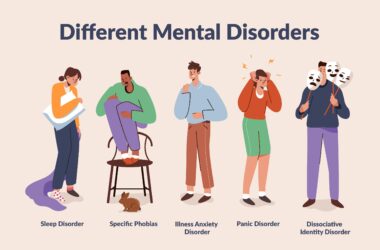What is Teenage Pregnancy?
Teenage Pregnancy refers to when a girl under 20 years old gets pregnant for any reason. It usually refers to the ages of 15-19, but a girl as young as 10 years old can get pregnant if she has reached puberty and started menstruation. Teenage pregnancy poses significant challenges both for the mother and the child including social, economic and health implications, especially for the younger end of the spectrum. Not only do teenage mothers have an increased risk of health complications during pregnancy and childbirth; they also often face challenges such as interrupted education and limited employment opportunities. Moreover, depending on the culture and region, most teenage mothers get ostracised, meaning many of them have to find a way to survive alone while taking care of their kid. All of these factors lead to or worsen existing poverty for teenage mothers and their families.
Read More: Meditation and Types of Meditation
2 Causes of Teenage Pregnancy
Although there are many reasons that can lead to teenage pregnancies, they all can be broadly categorised under the following 2:
Lack of Knowledge and Access to Sexual and Reproductive Health Education
Inadequate sex education and limited access to contraception contribute to higher rates of teenage pregnancy. Especially in certain cultures and developing regions, sex education is considered a taboo and even unethical. The prevalence of this mindset leads to an overall lack of adequate and accurate knowledge of safe sex practices and reproductive health. Without comprehensive information about sexual health, contraception methods, and reproductive rights, teenagers may engage in unprotected sexual activity unintentionally, increasing the risk of pregnancy.
Socioeconomic Factors
Various socioeconomic factors contribute significantly to the rise of teen pregnancies. Some of these factors include poverty, limited access to healthcare, unstable family environments, and lack of educational and employment opportunities. Teenagers from disadvantaged backgrounds face an increased pressure to engage in risky behaviours, including early sexual activity, as a means of seeking validation, escaping challenging circumstances, or fulfilling basic needs. Many impoverished teenagers also get forced into sex work as a means of survival. Additionally, limited access to contraception and reproductive healthcare services exacerbates the risk of unintended pregnancies among economically vulnerable populations and rural regions.
Read More: Types of Relationships
What Are the Impacts Of Poverty And Teenage Pregnancy
Educational Attainment
Teenage pregnancy often disrupts educational attainment, as young mothers may face challenges in completing their schooling due to the demands of pregnancy and childcare responsibilities. They may also have to give up on their education due to lack of monetary resources and/or systematic discrimination in schools against young expecting mothers. The social consequences such as bullying also discourage many young mothers from continuing their education. Interruptions in education also limit future opportunities for employment and higher education, perpetuating cycles of poverty in a society where teen pregnancies are prevalent.
Economic Strain
Teenage pregnancy can significantly increase economic strain, as young parents may lack the financial resources and stability to support themselves and their children. Limited employment opportunities and lower wages, coupled with the costs of raising a child, can lead to financial hardship and reliance on social assistance programs. Thus, many teenage mothers get pushed to the brink of poverty or under the poverty line; especially in cases where they have no support from their families or their families too are from an impoverished background.
Health and Well-being
Teenage pregnancy poses risks to both the mother and child’s health and well-being. Teenage mothers are at higher risk of experiencing complications during pregnancy and childbirth, as their bodies may not be fully developed to support a healthy pregnancy. Additionally, children born to teenage mothers may face higher rates of mortality, low birth weight, preterm birth, and developmental delays. This in turn puts pressure on the healthcare system of a region or country where teenage pregnancies are high or the norm. Moreover, poverty can worsen these issues due to teenage parents not having the required financial means to acquire appropriate healthcare.
Read More: Social Media Impacts Gen Z’s Mental Health
Social and Emotional Development
Poverty and teenage pregnancy can impact social and emotional development, as young parents may face stigma, isolation, and judgement from their peers and community. In many cases, teenage parents get cut off by their own families too, leaving them with no social or emotional support. Limited social support networks and feelings of inadequacy or shame contribute to stress, anxiety, and depression among teenage mothers and fathers, which in turn also harms their child. Teenage parents are already not equipped to properly care for a child, and having an unstable mental health can lead to dysfunctional family dynamics and inadequate.toxic upbringing of the child.
Long-Term Outcomes
The impacts of teenage pregnancy can have long-term consequences for both the parent and child especially in families living in poverty. Teenage mothers are more likely to experience lower educational attainment, higher rates of unemployment, and poorer physical and mental health outcomes later in life. Children born to teenage mothers may face higher risks of poverty, academic underachievement, and involvement in the criminal justice system. All of these in the big picture also hinder the social and economic growth of the entire region or country where poverty and teenage pregnancy are common.
Read More: Generation Z’s Mental Health Issues
Conclusion
Poverty and teenage pregnancy not only affect individuals but also have profound consequences for society as a whole. These issues perpetuate cycles of disadvantage and contribute to broader social and economic challenges. Teenage pregnancy often leads to interrupted education, economic strain, health complications, and social isolation for young parents, hindering their ability to reach their full potential and contribute positively to society. Moreover, the long-term impacts of teenage pregnancy, such as lower educational attainment and higher rates of poverty among young parents and their children, can perpetuate intergenerational cycles of disadvantage and limit social mobility. These cycles can destroy the social and economic systems of countries where poverty and teenage pregnancy are the norm, causing stunted national growth. Therefore, addressing the root causes of poverty and providing comprehensive support services for teenage parents are essential steps in mitigating the impact of teenage pregnancy on individuals and society, promoting social equity, and fostering opportunities for all members of the community to thrive.
FAQs
Teenage pregnancy poses challenges such as interrupted education, limited employment opportunities, health risks, and social stigma for both the mother and child, perpetuating cycles of poverty and disadvantage.
Teen pregnancy can result from factors like lack of access to comprehensive sex education, limited contraceptive use, socio-economic disparities, unstable family environments, and cultural norms.
Solutions include comprehensive sex education, access to contraception and reproductive healthcare services, addressing socio-economic disparities, providing support for young parents, and promoting gender equality and empowerment.







